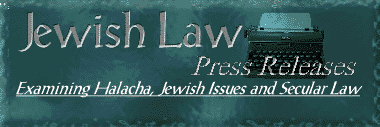

Press Releases
June 29, 1997
CONSTITUTIONAL AMENDMENT AND NEW STATE LAWS UNDER CONSIDERATION IN WAKE OF HIGH COURT DECISION
Invalidation of Federal Religious Freedom Law Prompts Proposals
WASHINGTON, D.C. -- In the immediate aftermath of a U.S. Supreme Court ruling last week striking down a four-year-old landmark federal law designed to protect the free exercise of religion against governmental encroachment, religious and civil liberties groups across the nation have already begun considering other possible avenues to safeguard religious liberty -- including the possibility of pursuing a new amendment to the United States constitution.
The 1993 federal legislation, the Religious Freedom Restoration Act (RFRA), was enacted to mitigate the effects of a 1990 High Court ruling that the First Amendment's protection for the "free exercise of religion" applies only in situations where government passes a law specifically designed to burden religion. Where, however, government passes a law of "general applicability" -- such as a law against the use of drugs, which was at issue in the 1990 case -- the Court declined to find any constitutional protection for freedom of religion.
It was that ruling, which made it readily apparent that the liberty of religious minorities was endangered, that led Congress to enact RFRA, which created an independent statutory level of protection, requiring that government demonstrate a "compelling interest" in burdening religious practice, even through a law of "general applicability". In last week's decision, however, the Supreme Court ruled, by a vote of 6-3, that Congress had exceeded its constitutional authority in enacting RFRA. Accordingly, if a law of general applicability now imposes a burden on religious practice, there is no longer any requirement that government demonstrate a compelling interest in its enforcement against the religious practitioner.
Among those worried about the possible effects of a United States sans RFRA is Agudath Israel of America, which was deeply involved in the development of the religious freedom legislation, had joined an amicus curiae ("friend of the court") brief supporting RFRA's constitutionality. At a Capitol Hill press conference the day the Supreme Court issued its ruling, the Orthodox organization's Washington Office director and counsel, Abba Cohen, said that the ruling "will dramatically change America's hallowed tradition of religious freedom and tolerance." David Zwiebel, Agudath Israel's director of government affairs and general counsel, cited several examples of problems that Orthodox Jews could face:
"Laws of general applicability could be used to harm our community's interests in such contexts as a synagogue's or yeshiva's right to distinguish between the sexes in the face of generally applicable anti-discrimination laws; a Jewish decedent's right to avoid an autopsy in the face of generally applicable laws empowering medical examiners to perform post-mortem procedures; an Orthodox community's right to build synagogues in the face of generally applicable zoning laws that restrict certain types of housing."
In the wake of the federal statute's demise, religious freedom advocates are considering several possible options. One is the possibility of pursuing RFRA-type legislation on a state-by-state basis. According to Mr. Cohen, the High Court's determination that Congress had no authority to enact the law is not applicable to state legislative bodies. Agudath Israel is therefore mobilizing its regional representatives across the United States to work with their local state governments in promoting such legislation.
Another approach being considered, one that would resolve the problem in a more sweeping manner, is the possibility of a new constitutional amendment to protect the practice of religion. "Obviously," Mr. Cohen noted, "amending the constitution is no simple matter. But then again, religious freedom is no trivial matter. We must leave no stone unturned in our effort to regain the protection we once had."
Copyright © 1997-2008 by Ira Kasdan. All rights reserved.
DISCLAIMER